As society continues to evolve, so do our communities – including the church. Discover how Good Courage Farm, a regenerative farm ministry, is making a lasting impact on their community through sustainable agriculture, creation care, and radical hospitality.
In this enlightening episode of the Pivot Podcast, we’re joined by Kerri Meyer, co-founder of Good Courage Farm, as she shares the inspiring journey of their ministry and the profound connection between faith, food justice, and regenerative farming.
Good Courage Farm lies about an hour west of the Twin Cities metro area in Hutchinson, Minnesota. Looking for coffee and a slice of something sweet? Stop by for Pie + Prayer, a twice-weekly worship and prayer service in the silo chapel. Interested in a small group… where gatherings are spent tending to and harvesting grapes for Eucharistic wine? Join the Vineyard Stewards. Interested in partnering your community or church food ministry with a local farm? Reach out.
So how did one farm – one ministry – wind up with its fingers in (pardon the pun) so many pies?
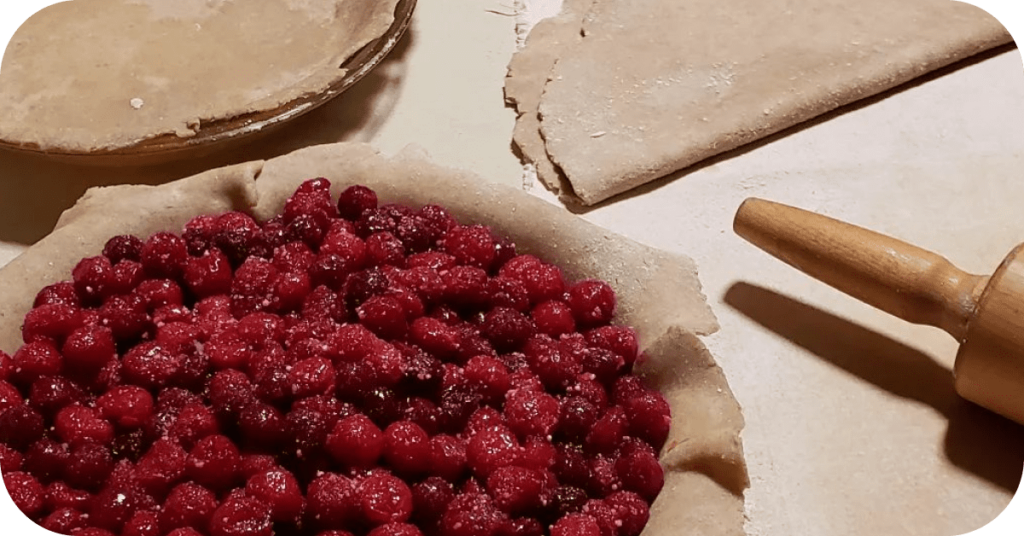
Photo Credit: Good Courage Farm’s handmade gooseberry pie
From Food Justice in San Francisco to Regenerative Agriculture in Rural Minnesota: Kerri Meyer’s Journey into Ecotheology
Kerri Meyer is an ordained Episcopal priest who founded Good Courage Farm with her wife Jen back in 2019. Amidst the bountiful fields of Good Courage Farm, something extraordinary is taking root.
It’s not just a fruit farm or an agrarian endeavor; it’s a profound intersection of faith, food justice, and regenerative farming. With the completion of their fourth growing season, Kerri and Jen are plowing forward with a steady commitment to nurturing both the land and the souls of their community.
Neither Kerri nor Jen came into the adventure with much (or any!) farming experience. “The learning curve is so steep that it actually kind of just curves back on itself and you’re maybe upside down hanging on for dear life,” laughs Kerri.
Prior to the founding of Good Courage Farm, Kerri served at St. Gregory of Nyssa Episcopal Church in San Francisco. The parish had an innovative, engaged liturgical life, and it shaped Kerri’s identity as a priest through her involvement with its Food Pantry in particular. That experience planted some of the seeds for Kerri’s current vocation right at the intersection of food and faith.
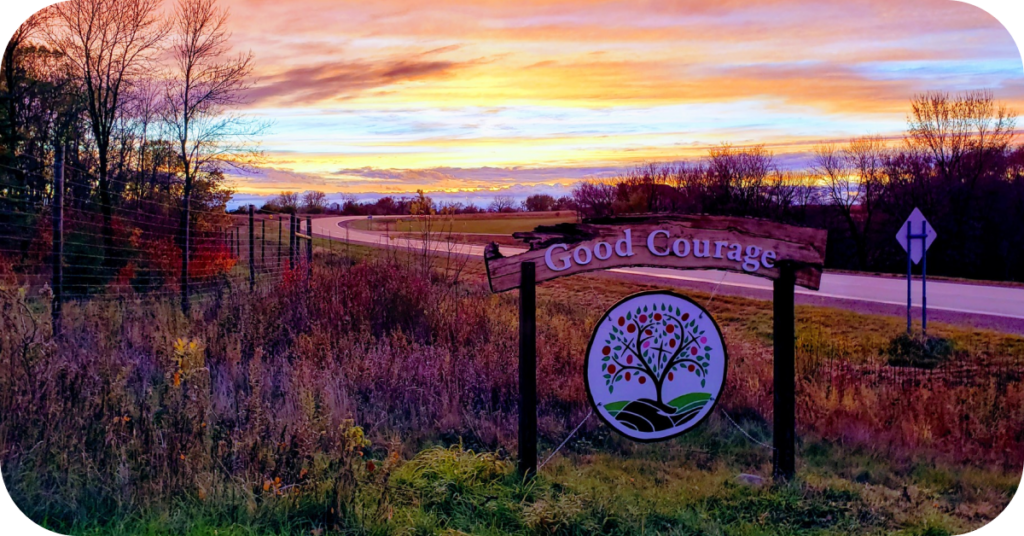
Photo Credit: Good Courage Farm
Kerri and Jen committed to purchasing the farm while still living in San Francisco. They were all in and dedicated after only the briefest of conversations with the Episcopal Church in Minnesota, because they put their offer down on the property the moment the bishop announced his retirement.
Unsurprisingly, when they called the diocese up to share the exciting new project, it was tough to find someone with a moment to spare. They made the move anyway; they made the leap excited to begin meeting people, building relationships, and doing new things with God’s help. And then COVID hit. The plan went out the window for a while. Eventually they got in contact with the 10th bishop of Minnesota, who turned out to be the ultimate cheerleader for the project, and the farm has been a beloved faithful innovation project for the Episcopal Church of Minnesota ever since.
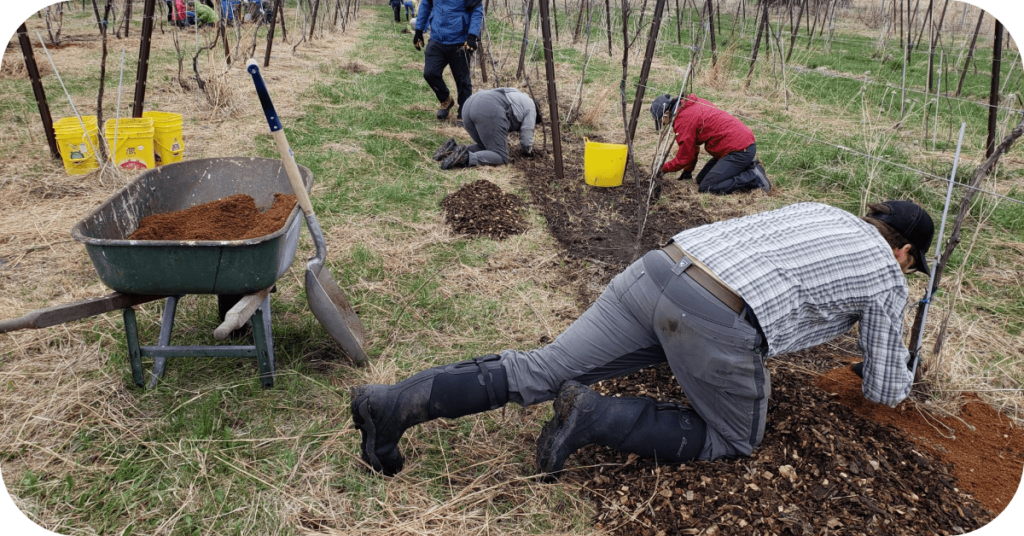
Photo Credit: Community members working together at Good Courage Farm
Faith and Ecology: How Good Courage Farm Supports the Community, Stewards the Land, and Follows God’s Call into Relationship
Good Courage Farm has developed a handful of projects and ministries over the years.
Vineyard Stewards Small Group Ministry
When people come together in small groups on Good Courage Farm, they do so in relationship with the vineyard, where they grow table grapes and wine grapes.
“There’s so much varied and really gratifying work that we can do together in the vineyard. And the Gospels are just full of metaphor and image… really understanding what it means to attend to a vineyard could unlock things that we might not otherwise have understood in Jesus’ teaching and ministry.”
Participants dig into the vineyard and fruit imagery of the Gospels and the Psalms, focused on gaining a deeper understanding of God, the Holy Spirit, and their relationship with and in Christ. Then they join together to pray, sing, prune, mulch, and harvest grapes.
At the end of the season, they press those grapes into Eucharistic wine to bring back to their communities.
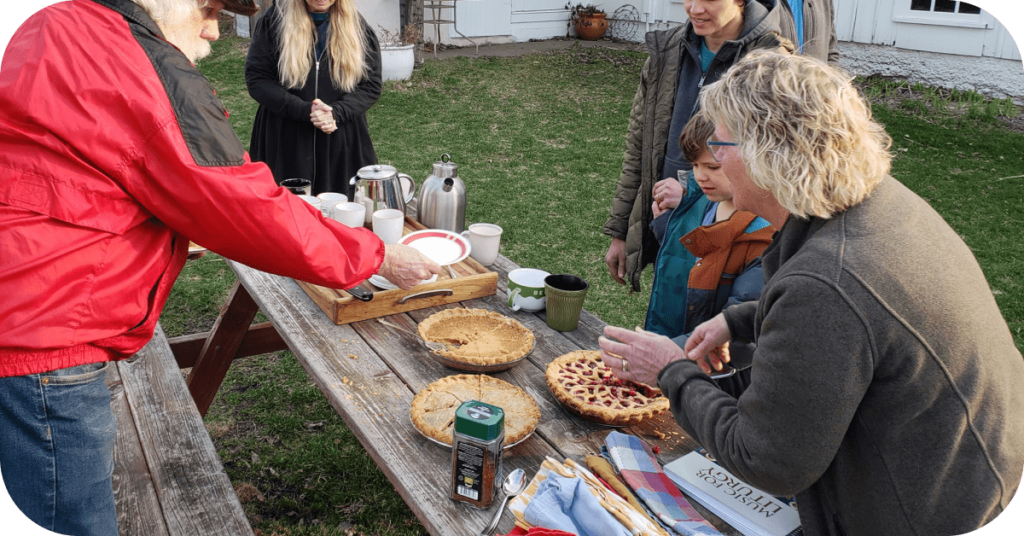
Photo Credit: Good Courage Farm community members gathering for Pie+Prayer
Pie + Prayer
As they prayerfully explored ideas for using the crops that proved less useful to their food ministry partners – “Our neighbors at McLeod County Emergency Food Shelf,” says Kerri, “They’re not there because their family ran out of gooseberries, right?” – Jen and Kerri found themselves drawn to the idea of pie.
“Pie becomes an expression of hospitality,” Kerri emphasizes, “But also something sacramental, almost, where we get to engage through our senses and enjoy something that that you don’t have to have. Nobody has to have pie. You can live without pie, but it’s beautiful and delightful and delicious and a joy to share with one another and I think evidence that God really wants us to be happy on Earth.”
A regular community gathers each week at the farm for that pie, eaten in the barnyard as the sun sets – and then the group gathers to sing evening prayer in the farm’s silo chapel, surrounded by the smells and the sounds of creation.
Pie and Prayer has been life-giving for many people, including locals who attend on Wednesday nights and travelers who make a stop on their road trips for the Saturday morning gathering.
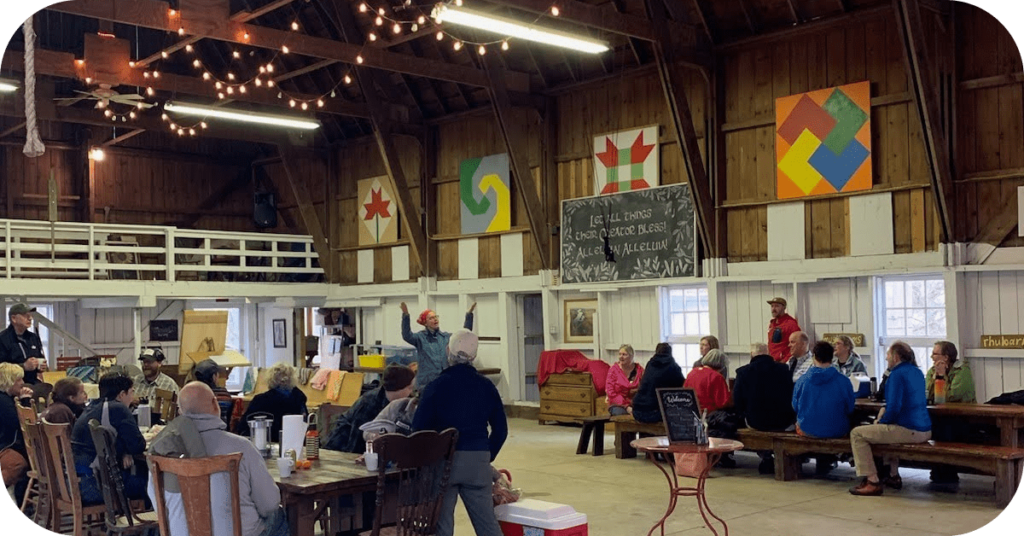
Photo Credit: Community members gathering for fellowship at Good Courage Farm.
Partnerships with Church-based Food Ministries and Local Restaurants
Good Courage Farm partners with All Saints Episcopal Indian Mission and First Nations Kitchen, an indigenous-led food justice ministry, as well as with the Spanish-language community of San Nicolas, an offshoot of the Episcopal Church of Saint Nicholas.
“We want to be a place that people know they can come and experience hospitality and community and grace,” Kerri says. “So, we’re always looking for ways to invite people in.”
Diving into Farm-Based Ministry: The Dos and Don’ts
What recommendations does Kerri have for those interested in integrating farming and ministry? We look to her own story for insights:
1. Choose the right spot.
Kerri chose Hutchinson, a town with a colorful history, as the site of Good Courage Farm due to its strong pre-existing community of both organic farmers and innovative faith communities. “There are folks out here who are innovating both in the world of farming and in the world of being church together,” Kerri reflects. They came knowing many of their farmer neighbor friends were deeply faith-filled people, though likely not yet connected to a faith community, with the intention of ministering to them in whatever way possible. The result is a supportive, rich community of folks who are farming in ways that are regenerative and attentive to the inherent goodness of creation.
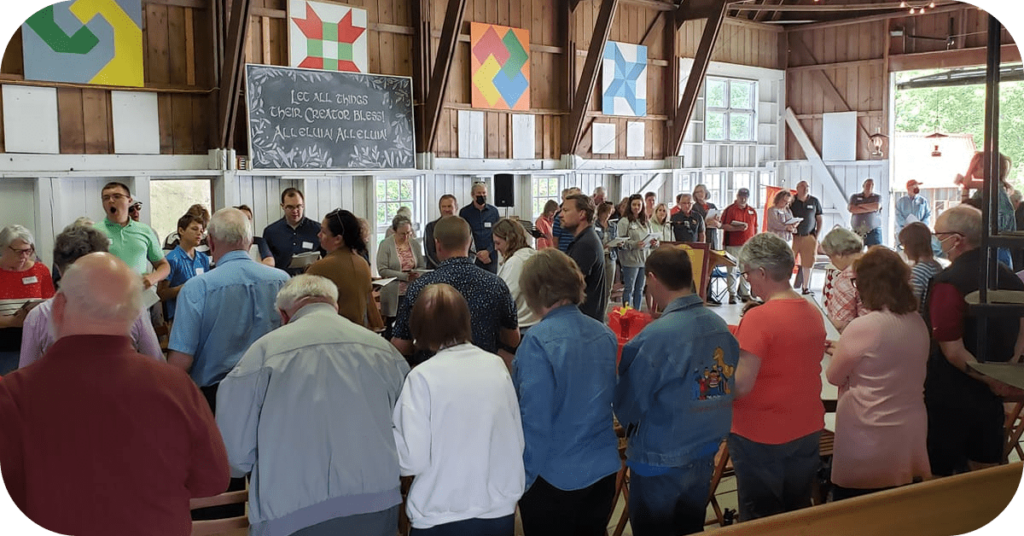
Photo Credit: Community members of Good Courage Farm fostering fellowship and connection.
2. Love your neighbor, and love the land.
Good Courage Farm has built up a community of farmers. Still, they’ve also been joined by neighbors from all kinds of faith communities who are just really interested in how it is we feed one another, both practically speaking and in response to Jesus’ commandment to do so. After just a few years of loving their neighbors and loving the land on which they worship and seek justice together, the farm has developed a strong network of relationships.
“Our ecology is vast, in the same way that that aspen groves are connected across miles underground.”
One of the things that the Good Courage team hopes for is that their focus on food and on the connection through food as both a basic need and a basic source of delight, the urban/rural cultural divide can be bridged.
For Kerri, that means a focus on hospitality. Good Courage Farm had about a thousand people come through the farm last growing season, and they welcomed everybody with delight.
“God is inviting us into relationship…through the land and through our relationships with neighbors. And so the idea that church ought to be maybe somehow an experience of relationship with our neighbors’ vis a vis the land that we occupy in common. That feels pretty natural.”
3. Be prepared for a steep learning curve – and unexpected challenges.
Learning curve aside, Kerry says, the day-to-day work of sustaining the farm is impacted by practical struggles that come with the climate crisis.
“There are things that we want to do and things that we want to plan, both in terms of growing food and sharing the work together,” she shares, “But then there’s an 80-mile-an-hour derecho and we have to clean up a bunch of damage or oh, we had hoped to put in a field of corn, but now we’re in our third season of drought. And so we can’t do those things for our food ministry partners because we just don’t have the infrastructure.”
In spite of it all, the Good Courage team wakes up every day and welcomes people into encounters with that crisis, witnessing it together and talking to their kindred in faith about what we ought to do differently.
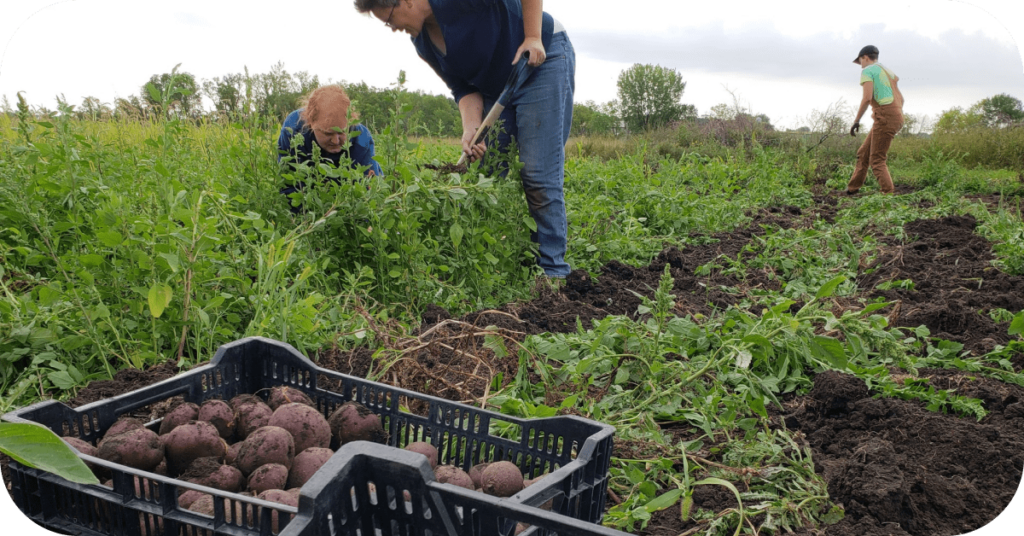
Photo Credit: Community members of Good Courage Farm working together on the farm
There’s also a real pressure point in terms of scale. Though growth has never been a goal for the farm’s team, it is occurring organically – in Kerri’s words, “because it’s God who gives the growth, and that’s just what’s happening.” However, scaling up would be risky for an organization that is committed to offering its space and ministry as a gift to those around them.
“I’ve said to everybody, to the bishop, to our neighbors here, to our board of directors, that the moment that this experience of God’s goodness in creation, the moment this becomes a transaction, that’s when I will know that I have to set this ministry down. Because food is a gift. The goodness of this world is a gift, and I want to give it away as a gift. But you still have to buy chicken feed, right? And you still have to pay the bills. So the real challenge is to figure out how to move forward as a gift economy.”
4. Stay connected, even if your initial leap is taken alone.
Although Good Courage Farm began without much conscious support from the Episcopal Church of Minnesota, Kerri has never had any regrets about starting the journey with the cart and the horse hitched the wrong way round.
“We made the leap and yeah, the church was there to meet us when we landed. And all of that was just pure faith – maybe foolishness – but maybe faith.”
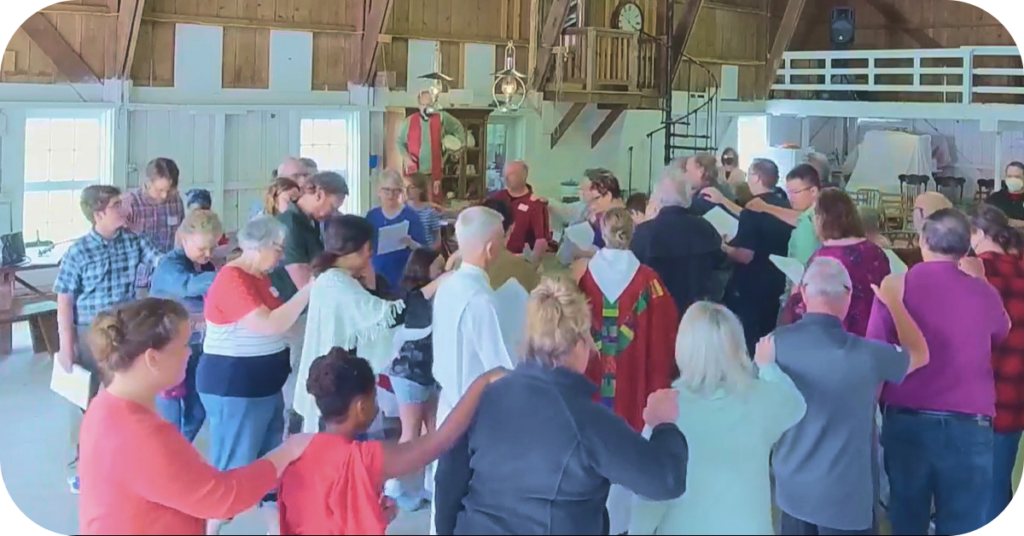
Photo Credit: Community members of Good Courage Farm fellowshipping together.
The important thing, she emphasizes, is the continued support and connection the project receives, not just from the leadership of her own denomination but from local churches and faith communities of every stripe. Innovative ministries like Good Courage Farm need the grounding presence of the institutional church community in order to truly thrive.
5. Listen to the Holy Spirit and follow God’s example.
Kerri points to her time at St. Gregory of Nyssa for the origins of the question that still shapes every choice and experiment at Good Courage:
“What do we see God doing, and how can we do something like that?”
In the context of the farm, the answer seems simple.
God is continually doing new things and making things new while inviting people into lasting relationship. In particular, the Hebrew scriptures reveal how God is inviting us into relationship with God’s self through the land and through our relationships with neighbors.
The Holy Spirit, too, is always moving through landscapes, our very wildness and brokenness, with a greening, renewing, hopeful power. And what do we see God doing in Jesus? Telling stories grounded in people’s felt experiences of the place where they live; feeding people; and eating with people.
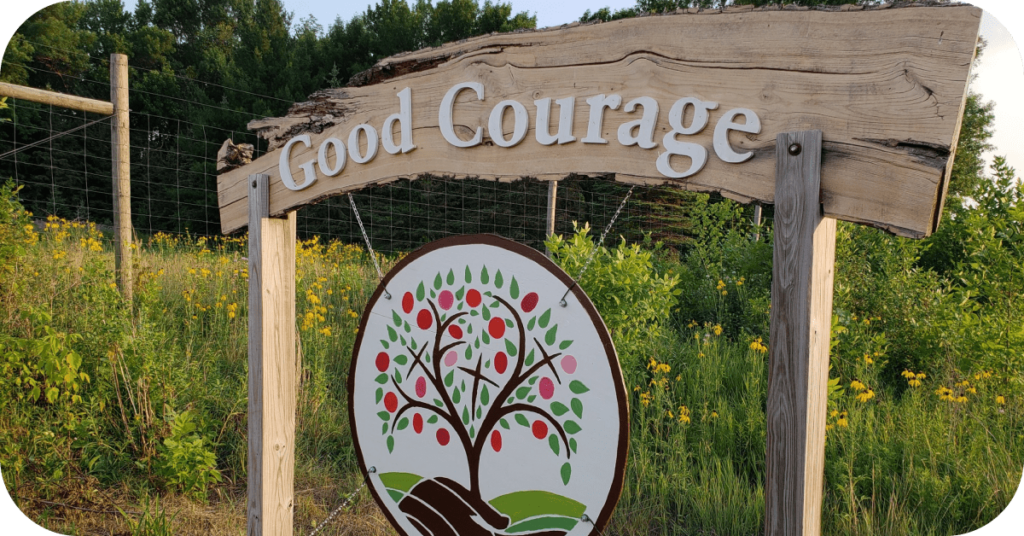
Photo Credit: Entrance sign to Good Courage Farm
To the folks of Good Courage Farm, that seems like a good place to start.
As we witness the transformative work of Good Courage Farm, we are reminded of the powerful intersection between faith, food justice, and environmental stewardship. Their story teaches us valuable lessons about the importance of embracing challenges, nurturing relationships, and following God’s example in caring for the land and our neighbors.
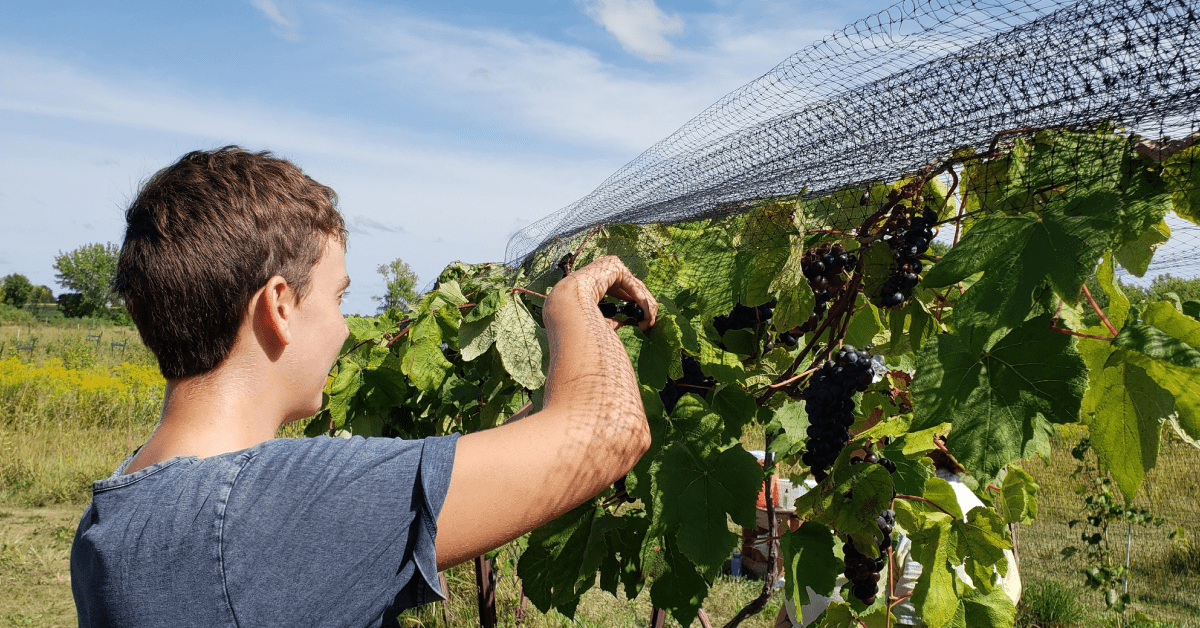



Dear Faith+ Lead,
may the love and peace of of our Lord and savior Jesus Christ be with you
Please we request your assistance with the farming project.
Here in Kenya we have over 180 orphans under our care and widows , the needy and vulnerable in our house church gathering as well as in our community who look to us for assistance on a regular basis or daily basis.
food has been a major challenge and area of need that has adversely affected us
I have made steps to lease land, as well as securing small credit from tractors that plough the land,
as well as we have manpower to plant the seeds and spray the crops. and harvest them
what we do not have is the seeds, fertilizer, herbicides, transportation, shelling , the cost outlined in our farming project proposal
We kindly request your assistance, we would like to be self-supportive in some way, and this is one way we can overcome the food challenge.
We kindly request your urgent support towards this project so that we can plant crops during this rainy season.
yours faithfully
william getumbe